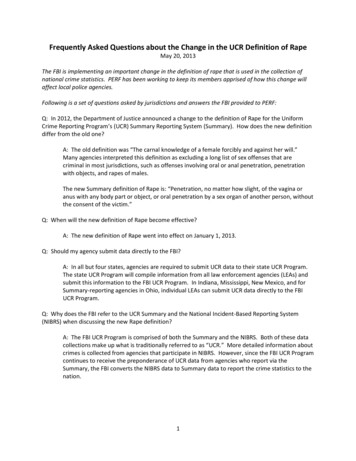
Transcription
Frequently Asked Questions about the Change in the UCR Definition of RapeMay 20, 2013The FBI is implementing an important change in the definition of rape that is used in the collection ofnational crime statistics. PERF has been working to keep its members apprised of how this change willaffect local police agencies.Following is a set of questions asked by jurisdictions and answers the FBI provided to PERF:Q: In 2012, the Department of Justice announced a change to the definition of Rape for the UniformCrime Reporting Program’s (UCR) Summary Reporting System (Summary). How does the new definitiondiffer from the old one?A: The old definition was “The carnal knowledge of a female forcibly and against her will.”Many agencies interpreted this definition as excluding a long list of sex offenses that arecriminal in most jurisdictions, such as offenses involving oral or anal penetration, penetrationwith objects, and rapes of males.The new Summary definition of Rape is: “Penetration, no matter how slight, of the vagina oranus with any body part or object, or oral penetration by a sex organ of another person, withoutthe consent of the victim.”Q: When will the new definition of Rape become effective?A: The new definition of Rape went into effect on January 1, 2013.Q: Should my agency submit data directly to the FBI?A: In all but four states, agencies are required to submit UCR data to their state UCR Program.The state UCR Program will compile information from all law enforcement agencies (LEAs) andsubmit this information to the FBI UCR Program. In Indiana, Mississippi, New Mexico, and forSummary-reporting agencies in Ohio, individual LEAs can submit UCR data directly to the FBIUCR Program.Q: Why does the FBI refer to the UCR Summary and the National Incident-Based Reporting System(NIBRS) when discussing the new Rape definition?A: The FBI UCR Program is comprised of both the Summary and the NIBRS. Both of these datacollections make up what is traditionally referred to as “UCR.” More detailed information aboutcrimes is collected from agencies that participate in NIBRS. However, since the FBI UCR Programcontinues to receive the preponderance of UCR data from agencies who report via theSummary, the FBI converts the NIBRS data to Summary data to report the crime statistics to thenation.1
Q: Has the definition of Rape changed for the NIBRS?A: The definition of Rape for agencies reporting via the NIBRS has changed only slightly, sincethe NIBRS already allows for all factors relevant to the collection of data under the newdefinition of Rape.Under the new rape definition, the FBI UCR Program will aggregate three sex offenses in theNIBRS into Rape in Summary for publication in Crime in the United States. The definitions of theoffenses are:11A Rape (except Statutory Rape)The carnal knowledge of a person, without the consent of the victim, including instanceswhere the victim is incapable of giving consent because of his/her age or because ofhis/her temporary or permanent mental or physical incapacity11B SodomyOral or anal sexual intercourse with another person, without the consent of the victim,including instances where the victim is incapable of giving consent because of his/herage or because of his/her temporary or permanent mental or physical incapacity11C Sexual Assault With An ObjectTo use an object or instrument to unlawfully penetrate, however slightly, the genital oranal opening of the body of another person, without the consent of the victim, includinginstances where the victim is incapable of giving consent because of his/her age orbecause of his/her temporary or permanent mental or physical incapacityQ: Which states report data to the federal government using the NIBRS?A: Currently, 14 states submit all statewide data to the FBI via the NIBRS. The states areArkansas, Delaware, Idaho, Iowa, Michigan, Montana, New Hampshire, North Dakota, SouthCarolina, South Dakota, Tennessee, Vermont, Virginia, and West Virginia. In addition to thesestates, there are individual LEAs in 21 more states, and an agency located within the District ofColumbia, which submit data via the NIBRS. LEAs in these states will not change the way inwhich they report Rape to the FBI, since NIBRS already allows for all factors relevant to the newexpanded definition of Rape.Q: My state is not one of the 14 statewide NIBRS states. How do I know if my state has decided toreport data using the new definition of Rape for 2013?A: Several states that have a state UCR Program and submit Summary data have indicated tothe FBI that they will be reporting data compliant with the definition of Rape implemented onJanuary 1, 2013. Please check with your state UCR Program to determine how your state willreport.2
Q: My agency would like to begin submitting data using the definition of Rape that was implemented onJanuary 1, but I do not see my state listed above. What options do I have?A: If you are in a state with a centralized UCR Program (your police department submitsmonthly crime statistics to a state agency), please reach out to your state UCR Program. If youdo not know who your point of contact is, please contact the FBI UCR Program at(304) 625-4830.For law enforcement agencies in Indiana, Mississippi, New Mexico, and Ohio, where individualLEAs can submit UCR data directly to the FBI UCR Program, if you are reporting UCR Summarydata but are not currently reporting data on the Excel Workbook, please contact the FBI UCRProgram at (304) 625-4830.Q: My state does not plan to collect data reflecting the new rape definition, what do I do?A: Contact your state UCR program coordinator to develop a timeline and strategy fortransitioning to the current definition of Rape.Q: I still have questions regarding the definition change. Whom should I contact?A: The FBI UCR Program has designated Ms. Mary Pat Reese from the FBI’s Criminal JusticeInformation Services (CJIS) Division’s Crime Statistics Management Unit as the point of contactfor any reporting questions your agency may have. Please contact Ms. Reese at(304) 625-3528 or via e-mail at mary.reese@leo.gov .Q: Do I count Statutory Rape under the revised UCR definition of Rape?A: No. The FBI UCR Program collects Statutory Rape only in the NIBRS. The NIBRS definesStatutory Rape as “Nonforcible sexual intercourse with a person who is under the statutory ageof consent,” and further explains that “If the victim was incapable of giving consent because ofhis/her youth or mental impairment, either temporary or permanent, law enforcement shouldclassify the offense as Rape, not Statutory Rape.”Q: How will the FBI UCR Program interpret NIBRS data related to sexual offenses for the reviseddefinition of Rape for the annual UCR publication?A: NIBRS already allows for collection of data on all types of Rape included in the newdefinition. Therefore, the CJIS Advisory Policy Board (APB) requested that the FBI UCR Programmake only minor changes to the sex offense definitions in NIBRS (i.e., the phrase “forcibly oragainst the victim’s will” would be changed to “without the consent of the victim”). And nochanges were made to the reporting requirements in the NIBRS. The FBI UCR Program willconvert the NIBRS offenses of Forcible Rape, Forcible Sodomy, and Sexual Assault with anObject, to the Summary offense of Rape for publication in Crime in the United States.Changes to any of the FBI CJIS Division’s criminal justice information systems must go throughthe CJIS Advisory Process. The FBI established the Advisory Process to ensure a “sharedmanagement” concept with the nation’s law enforcement community for all criminal justiceinformation systems managed by the CJIS Division. The CJIS APB process ensures that lawenforcement has the opportunity to discuss and vote on any policy or procedural changes to3
CJIS systems affecting law enforcement’s ability to provide information to the nation. The otheravenue for change to any of the CJIS Division’s criminal justice systems is through Congressionalmandate.Q: If an incident occurred in a previous year but was reported in 2013, should we apply the historical orthe revised definition of Rape?A: You should use the definition in effect in the year law enforcement became aware of thecrime and reported the crime to UCR. Even if an offense occurred in a prior year, if lawenforcement became aware of it and reported it in 2013, it should be consistent with the new2013 definition of Rape.Q: Is my agency required to report using the revised definition this year?A: Although the FBI is encouraging UCR contributors to report Rape according to the newdefinition, individual agencies who report through a state UCR Program should still reportfollowing the instructions given by their state UCR Program. If a state UCR Program has not yetimplemented the new definition of Rape, then an agency reporting to the state cannot reportunder the new definition of Rape.Q: How do I report if I use a hard copy reporting form?A: The FBI UCR Program has been transitioning to a paperless environment since 2010. Theprogram’s deadline for contributors to complete the paperless transition process is July 1, 2013.The FBI UCR Program encourages all LEAs reporting UCR Summary data and not currentlyreporting data using either the Excel Workbook or the flat file format to please contact the FBIUCR Program at (304) 625-4830 for more information about paperless reporting.The FBI UCR Program is in the process of updating the Monthly Return of Offenses Known tothe Police form for those states that use the form internally, but submit data electronically tothe FBI. The FBI UCR Program will release the new form on the FBI web site in June 2013.Q: How do I report if I submit data using a flat file?A: Summary agencies will report Rape via the flat file specification (i.e., a sequence of numbersand letters in a specific format which allows LEAs to directly upload data from their databaseinto the FBI’s UCR database) in record positions 31 – 680 on the Return A layout and by thepresence of the letter R of the record in position 18, which indicates the agency is reporting thecrime according to the new definition of Rape.Q: How do I report if I submit data using the Excel workbook?A: Summary agencies will report Rape via the Excel Workbook (i.e., an electronic representationof the UCR forms which allows LEAs to directly upload data from their database into the FBI’sUCR database) on line 2A, Rape.4
Q: Can individual agencies report using the new definition of Rape if their state is reporting under thehistorical definition?A: No. The FBI UCR Program does not intend to change the way in which local agencies reportto their established state UCR Programs. Currently, 47 states in the nation have their own stateUCR Programs (Ohio’s NIBRS agencies report via a state UCR Program; Ohio’s Summary agenciesreport as direct contributors), in addition to the programs run by tribal and federal lawenforcement.The FBI UCR Program encourages groups of LEAs (i.e., representing a state, tribe, or federaljurisdiction) to form a UCR Program which manages the collection of UCR data for the localagencies and reports the accumulated data to the FBI. The UCR Programs streamline thecollection of UCR data from the local agencies, ensure consistency and comparability of crimestatistics data, and provide a higher quality of service to the law enforcement community byoften publishing the collected statistics, providing audits of the collected data, and offeringtraining initiatives to keep the local agencies apprised of current trends in crime management.Local agencies in a state without a UCR Program report directly to the FBI UCR Program.Currently, there are 586 direct-contributing LEAs, with 143, or 24 percent, reporting Rape (asnewly defined) via the Excel Workbook.Q: How will UCR address the difference in the NIBRS and Summary definitions of Rape?A: For publication purposes, the FBI UCR Program will combine the Summary Rape data (asnewly defined) with the NIBRS Rape, Sodomy, and Sexual Assault with an Object data andpublish it as Rape.Although many perceive the data reported to the FBI UCR Program to be only the Summarydata, as published in Crime in the United States, in reality, some LEAs report the data via theSummary and others via NIBRS. Since the program continues to receive the preponderance ofUCR data from agencies who report via the Summary, the FBI converts the NIBRS data toSummary data to report the crime statistics to the nation.Q: Will the NIBRS definition of Rape be amended?A: There are no current plans to amend the NIBRS definition of Rape. The CJIS APB requestedthe FBI UCR Program make only minor changes to the NIBRS sex offense definitions.The current NIBRS defines Rape as:The carnal knowledge of a person, without the consent of the victim, including instanceswhere the victim is incapable of giving consent because of his/her age or because ofhis/her temporary or permanent mental or physical incapacity.5
Q: What about small children who cannot actually describe what has happened?A: The FBI UCR Program collects crime data about victims of any age. For example, if a victim isa small child who is unable to describe what happened and a LEA determines a rape occurred, itis within UCR guidelines for the LEA to classify the offense as Rape. The definition of Rape inboth the Summary and the NIBRS include instances in which the victim is incapable of givingconsent because of age (or because of temporary or permanent mental or physical incapacity,which also includes incapacity due to the influence of drugs or alcohol). Physical resistance isnot required on the part of the victim to demonstrate lack of consent.Q: We’re using the new definition for 2013. Does everything that we have already submitted in 2013need to be revised to reflect these changes?A: Yes. You should use the definition in effect the year in which the law enforcement agencybecame aware of the crime and is reporting the crime. Even if the offense occurred in a prioryear, if law enforcement became aware of it and reported it in 2013, it should be consistentwith the new 2013 definition.Q: Is the FBI planning to make a public statement in writing that will support law enforcement whenthey explain these changes to the public, the news media, community groups, and others?A: Yes. The FBI UCR Program plans to release information about the revised Rape definition onthe internet at http://www.fbi.gov/about-us/cjis/ucr , as well as on the Association of StateUniform Crime Reporting Programs (ASUCRP) web site and in the Law Enforcement Online (LEO)UCR Special Interest Group (SIG).Q: Where can we read more about the change and how it will affect our agency's UCR reporting? Is itonline on the UCR web site?A: The FBI UCR Program plans to release information about the revised Rape definition on theinternet at http://www.fbi.gov/about-us/cjis/ucr , as well as on the ASUCRP web site and inthe LEO UCR SIG.Q: What is the suggested manner in addressing discrepancies between UCR reporting and the statutoryrequirements needed to investigate a sexual assault?A: One of the objectives of the FBI UCR Program is to define offenses broadly enough toencompass statutory definitions of crimes that occur in all 50 states and the U.S. territories. If aLEA notes discrepancies between a state’s statutory offense definition and the FBI UCRProgram’s offense definitions, the LEA should contact the FBI UCR Program at 304-625-4830 todiscuss how it should report the data.Q: The offense code of Criminal Sexual Assault which we have mapped to the NIBRS Offense code of11A in our records management system only allows a female as a victim. To address rape with a male asa victim, we have added an additional offense that we have mapped to 11B. Will both of these offensesbe counted from our NIBRS submission, or will we need to make our application accept Male as a victimof an 11A offense?6
A: In the NIBRS, 11A Rape includes female victims of male offenders, and male victims offemale offenders. Rape in NIBRS includes male victims of male offenders as long as there is alsoat least one female offender. 11B Sodomy in NIBRS includes male victims of male offenders orfemale offenders, and female victims of male offenders or female offenders. If your programallows for all of those variations listed, it is compliant with the NIBRS.The FBI UCR Program will convert both offenses, Rape and Sodomy, in addition to the offenseSexual Assault with an Object, to Rape for publication in Crime in the United States. LEAs thatreport via the NIBRS will not need to change the way in which they report Rape to the FBI, sinceNIBRS already allows for all factors relevant to the collection of data under the new definition ofRape.Q: Are there going to be any meetings to discuss the UCR Human Trafficking data?A: Yes. The FBI UCR Program is planning to schedule conference calls with the state UCRProgram managers in the near future. Human Trafficking will be on the agenda.Q: What if I still have a question about how my agency can report information under the new definitionof Rape?A: The FBI UCR Program has established the UCR Forum on Law Enforcement Online (LEO),which is a discussion thread where participants can post a question and FBI UCR Program staffwill answer the question. Participants have the ability to subscribe to the UCR Forum. To accessthe UCR Forum, LEAs must have a LEO account and should: Log into the LEO using Mozilla Firefox at www.leo.gov Click on the LEO logoClick on the Special Interest Group (SIG) linkClick on the Access Type and select UnrestrictedClick on the UCR logoOn the top tabs, select ForumsControl-F to open search and type “UCR”Click Enter (this moves the list to UCR)Click on UCR in the listYou have entered the UCR ForumUsers with questions concerning access to the UCR SIG should contact Ms. Leslie Underwood bytelephone at (304) 625-4018 or by e-mail at leslie.underwood@leo.gov .Users with questions concerning access to the LEO or establishing an account should contact theLEO Technical Support by telephone at (888) 334-4536.For all other questions, please contact Ms. Mary Pat Reese from the FBI’s Criminal Justice InformationServices (CJIS) Division’s Crime Statistics Management Unit at (304) 625-3528 or via e-mail at mary.reese@leo.gov .7
Frequently Asked Questions about the Change in the UCR Definition of Rape May 20, 2013 The FBI is implementing an important change in the definition of rape that is used in the collection of national crime statistics. PERF has been working to keep its members apprised of how this

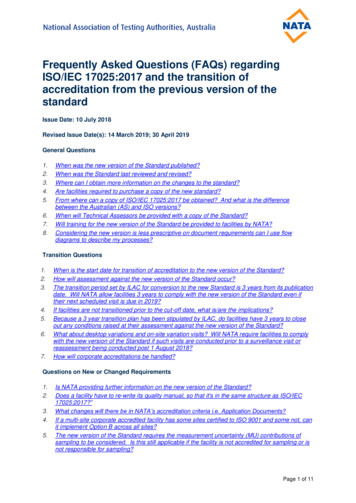
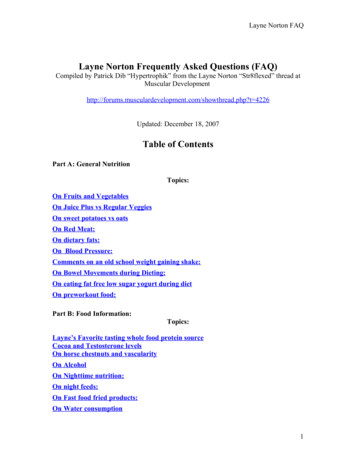
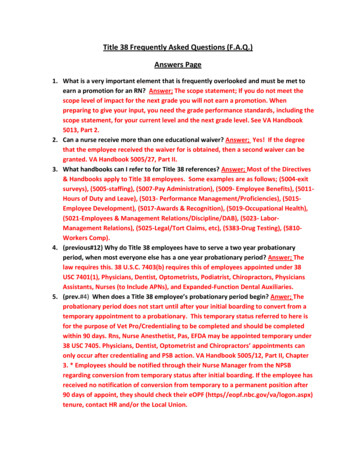

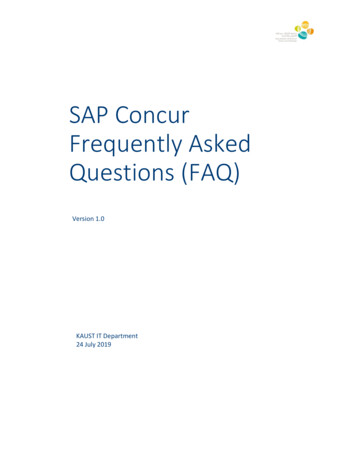
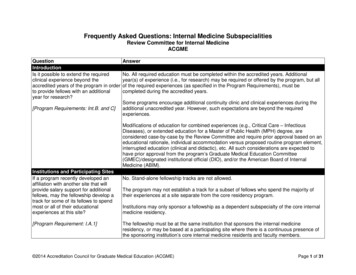
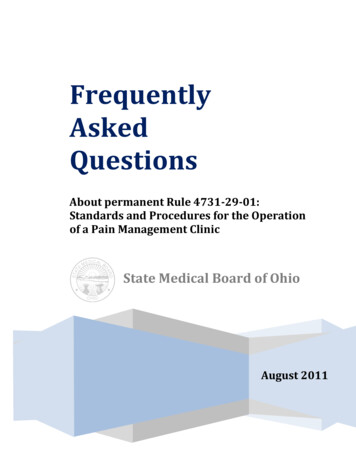
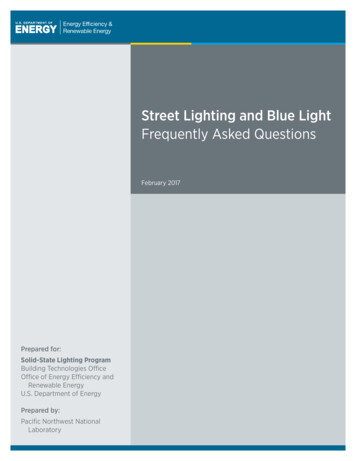
![Informatica Interview Questions and Answers [Scenario-Based]](/img/2/informatica-interview-questions-and-answers-scenario-based-1.jpg)
